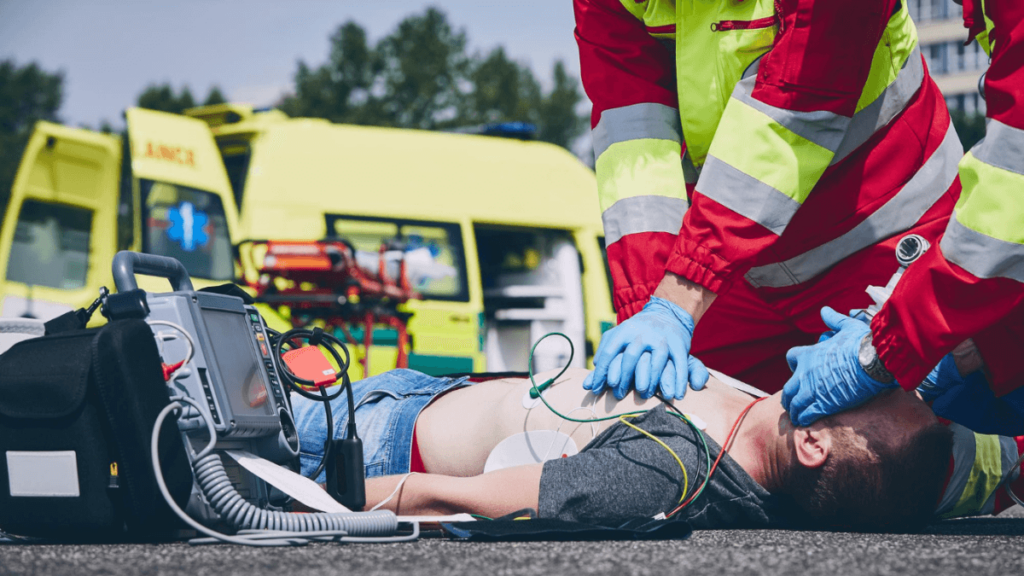Becoming a paramedic in South Africa is a noble and rewarding career choice. Paramedics are vital in emergency medical services (EMS), providing life-saving assistance to people in critical situations.
How to Become a Paramedic in South Africa: Qualifications & Requirements 2025
This guide provides a detailed roadmap on how to become a paramedic in South Africa, covering qualifications, requirements, training institutions, and career opportunities.
1. Understanding the Role of a Paramedic
A paramedic is a healthcare professional trained to provide emergency medical care to patients outside of hospitals. They work in ambulances, respond to emergency calls, and offer first aid and advanced medical treatment.
Key Responsibilities of a Paramedic
- Assessing patients and providing emergency medical care.
- Administering medication and performing medical procedures.
- Transporting patients to hospitals safely.
- Using medical equipment such as defibrillators, ventilators, and monitoring devices.
- Communicating effectively with hospital staff, emergency responders, and patients.
2. Types of Paramedic Qualifications in South Africa
There are different levels of paramedic training in South Africa, each with specific qualifications and requirements.
Basic Life Support (BLS) – Basic Ambulance Assistant (BAA)
- Entry-level qualification for paramedics.
- Shortest course, usually 4-6 weeks.
- Provides basic emergency medical assistance.
- Suitable for those looking to enter EMS quickly.
Intermediate Life Support (ILS) – Ambulance Emergency Assistant (AEA)
- A step above BAA with more advanced training.
- Course duration is around 3 months.
- Allows administration of some medications and use of advanced medical equipment.
Advanced Life Support (ALS) – Critical Care Assistant (CCA)
- High-level paramedic qualification.
- Requires extensive training (9-12 months).
- Advanced emergency medical skills, including airway management, cardiac life support, and trauma care.
Higher Education Pathway: Diploma or Degree in Emergency Medical Care
- Diploma in Emergency Medical Care (EMC)
- A 2-year course.
- Covers advanced paramedic training.
- Available at universities and accredited institutions.
- Bachelor of Emergency Medical Care (BEMC)
- A 4-year degree program.
- Provides extensive training in emergency medical care.
- Graduates can work as Emergency Care Practitioners (ECPs), the highest level of paramedic qualification in South Africa.
3. Academic and Entry Requirements
To become a paramedic, you must meet certain academic qualifications and other requirements.
Basic Requirements
- Minimum educational qualification: Grade 12 (Matric) with Mathematics, Physical Science, and Biology is preferred.
- Age requirement: Must be at least 18 years old.
- Physical fitness: Paramedics must be in good physical health as the job requires strength and stamina.
- Driver’s license: A valid code 10 (C1) driver’s license with a Professional Driving Permit (PrDP) is usually required.
Admission Requirements for a Paramedic Course
- Matric Certificate: With at least 50% in Mathematics, English, and Life Sciences.
- Medical Fitness Certificate: To ensure you are fit to handle physical tasks.
- Criminal Record Clearance: A clean criminal record is necessary to work in EMS.
4. Accredited Training Institutions for Paramedic Courses in South Africa
It is essential to study at a Health Professions Council of South Africa (HPCSA)-accredited institution.
Top Universities & Colleges Offering Paramedic Training
- Durban University of Technology (DUT)
- Offers a Diploma in Emergency Medical Care.
- Cape Peninsula University of Technology (CPUT)
- Provides a Bachelor of Emergency Medical Care.
- University of Johannesburg (UJ)
- Offers a Bachelor’s degree in Emergency Medical Care.
- Nelson Mandela University (NMU)
- Provides paramedic courses with hands-on training.
- Netcare Education and Mediclinic College
- Offers Basic, Intermediate, and Advanced paramedic courses.
- Private EMS Training Centers
- Various accredited institutions offer Basic Ambulance Assistant and other short courses.
5. Licensing & Registration as a Paramedic in South Africa
Once training is completed, paramedics must register with the Health Professions Council of South Africa (HPCSA).
Steps to Register as a Paramedic
- Complete the required training at an accredited institution.
- Pass the National Exam for the specific qualification level.
- Apply for HPCSA registration under the relevant paramedic category.
- Obtain a Professional Driving Permit (PrDP) for emergency services.
- Undergo continued professional development (CPD) to maintain registration.
6. Career Opportunities for Paramedics in South Africa
Once qualified, paramedics can work in various sectors, including:
- Public Emergency Services: Government ambulance services such as the Gauteng, Western Cape, or KZN EMS.
- Private Ambulance Services: Companies like Netcare 911, ER24, and Life Healthcare.
- Hospitals and Clinics: Providing emergency medical care in healthcare facilities.
- Industrial and Corporate EMS: Working on construction sites, mines, and corporate emergency teams.
- Flight and Offshore Paramedics: Providing medical care in remote or high-risk environments.
- Disaster and Rescue Services: Assisting in disaster response and search-and-rescue missions.
Recommended for you: How to Write a Government Job CV That Gets Noticed: 10 Easy Steps
7. Salary Expectations for Paramedics in South Africa
Paramedic salaries depend on qualifications, experience, and employer.
- Basic Ambulance Assistant (BAA): R6,000 – R12,000 per month.
- Ambulance Emergency Assistant (AEA): R12,000 – R18,000 per month.
- Critical Care Assistant (CCA): R20,000 – R35,000 per month.
- Emergency Care Practitioner (ECP): R30,000 – R45,000 per month.
Private sector paramedics often earn more than those in public services.
8. Challenges and Rewards of Being a Paramedic
Challenges
- High-stress environment with life-or-death decisions.
- Long hours, including night shifts and weekends.
- Exposure to trauma and emotional distress.
Rewards
- The ability to save lives and help people in critical situations.
- Career growth and opportunities in specialized fields.
- Job stability and demand for paramedics in South Africa.
9. Conclusion: Steps to Becoming a Paramedic
- Complete Matric with the required subjects.
- Choose a training route (short course or degree/diploma).
- Attend an HPCSA-accredited training institution.
- Pass all exams and practical training.
- Register with the HPCSA as a paramedic.
- Apply for jobs in the public or private sector.
- Continue professional development to advance your career.
Also check: Firefighter Course Requirements: What You Need to Get Started
Becoming a paramedic in South Africa is a fulfilling career path that requires dedication, training, and a passion for helping others. Whether you start with a Basic Ambulance Assistant (BAA) course or pursue a Bachelor of Emergency Medical Care (BEMC), the profession offers various entry points and career growth opportunities.






